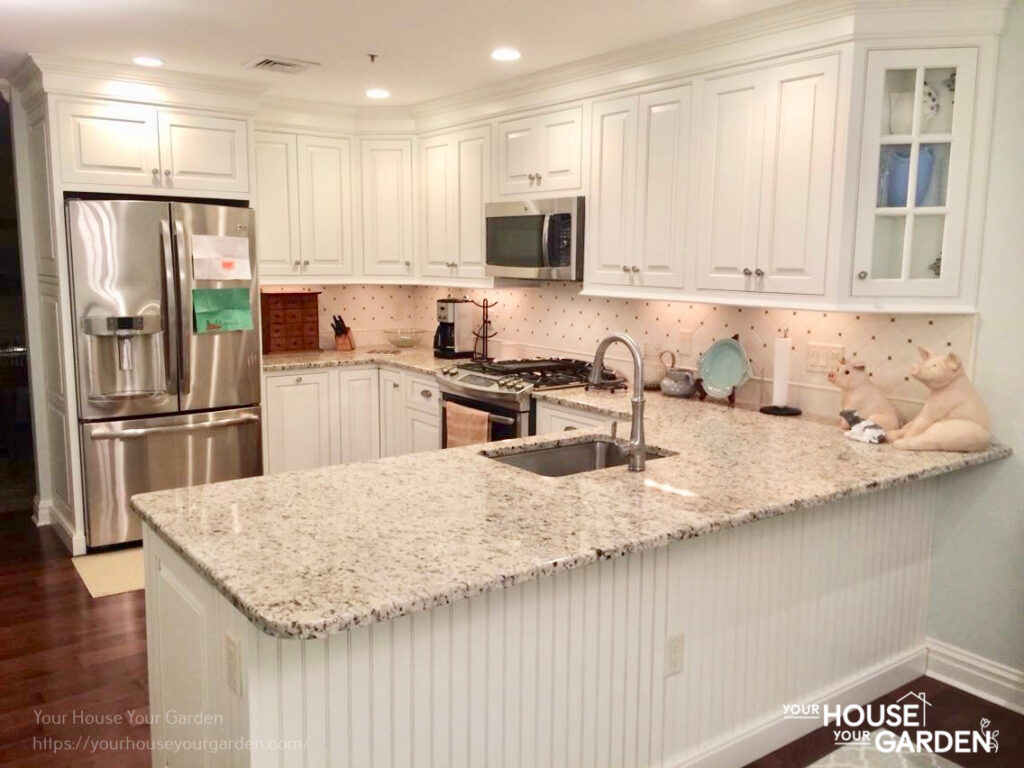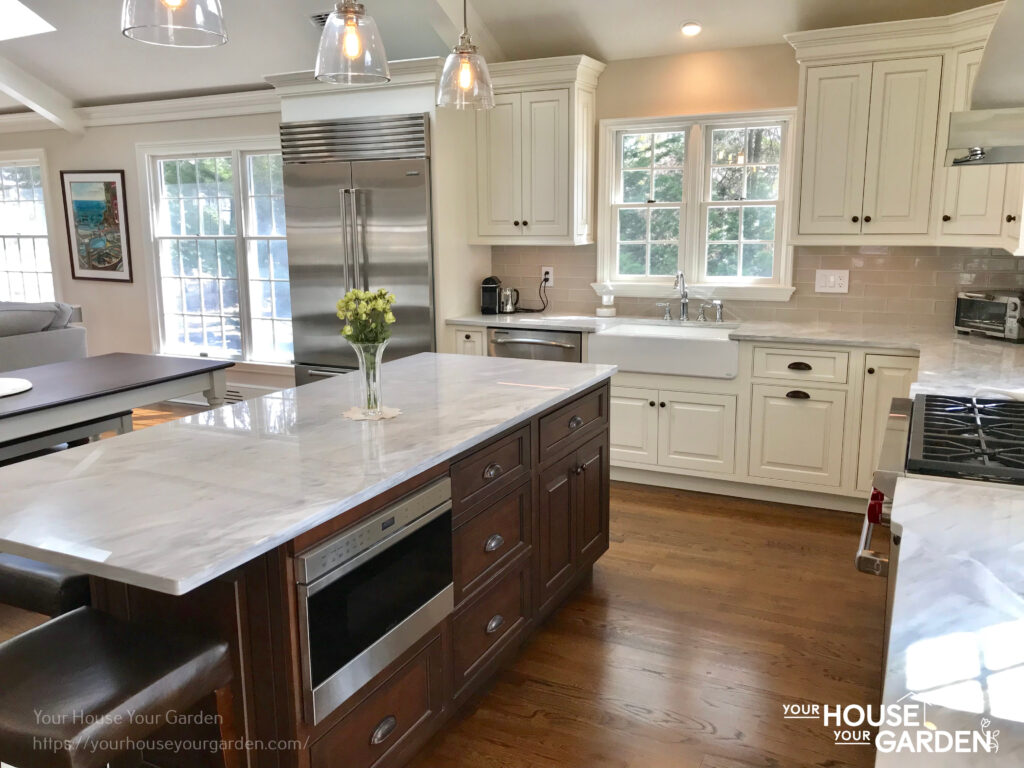Quartz Countertops
Home » Home Remodeling » Kitchen Countertops » Quartz Countertops

Choosing counters around a space that fits your style can be difficult when you are choosing between different materials like white quartz, concrete, natural stone, or wood. Not only do you have to take prices into consideration but also whether or not a material is good for a busy cooking space where stains are inevitable if it has to be sealed, and its durability. For homeowners considering quartz, here’s Your House Your Garden’s guide to this countertop material.
History of Quartz Countertops
Though the earth is abundant in natural quartz, as it is the second most common mineral, manufacturers recognized its potential as a hard surface material over 50 years ago. Marcello Toncelli, the inventor of the engineered quartz procedure and founder of Breton S.p.A in 1963 was intent on developing technology for manufacturing compound stones. This Italian company remains a leading supplier of the equipment needed to manufacture engineered stone as Breton was able to reinforce quartz into a durable, nearly non-porous surface by combining it with polymer resins. This innovative countertop would vary in grain, color, and finish, unlike natural stone slabs which are what made it popular in Italian and European kitchens. It was only in the ‘90s that Americans adapted quartz countertops into their homes and continue to do so today.
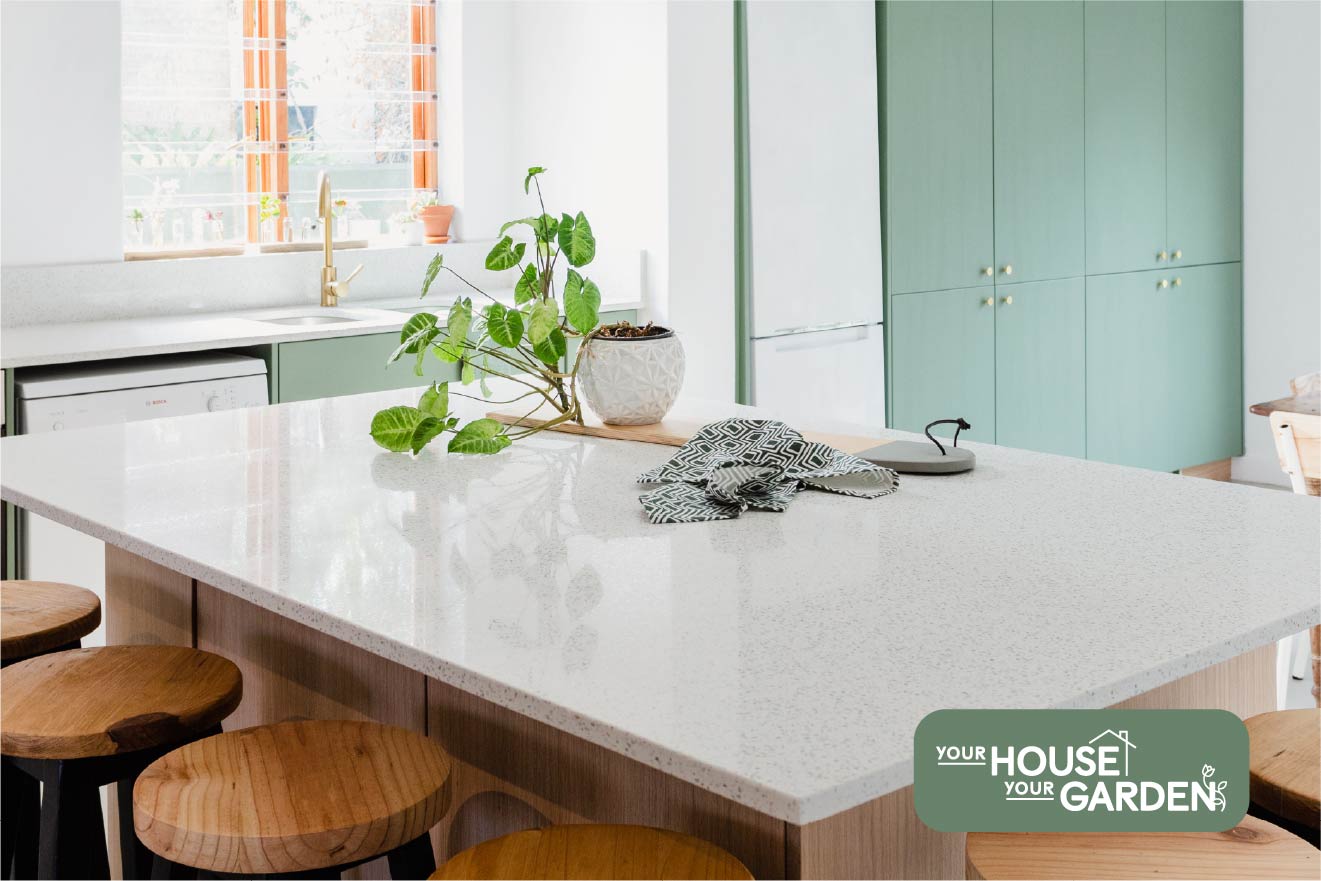
The Benefits of Quartz
Durability
After installation during kitchen remodeling, you will not need to replace your quartz kitchen countertops for years when you take care of them properly. As a busy area of the house, your kitchen will need a countertop that can withstand clattering utensils and banging pans. Quartz can withstand chipping, resist staining, are scratch-resistant, and is scorch-resistant.
Versatile Appearance
Compared to other surfaces, quartz countertops are more consistent in composition per square foot because of how it is manufactured. Also, quartz countertop colors are more varied and there are more patterns available compared to natural stone countertops. Quartz counters can give your kitchen a contemporary look and can mimic the appearance of granite, leathered concrete, or polished marble.
Low-maintenance
As a non-porous surface for kitchen countertops, quartz counters are not high maintenance. A quartz countertop does not need sealing and is resistant to corrosion and liquid spills. It stands up well to anything that can stain your countertop and does not harbor bacteria. When you do spill oil, wine, or coffee, simply wipe your quartz countertop with mild soap and water. You will not require any special household cleaners or heavy scrubbing.
The Basics of Quartz Kitchen Countertops
Manufacturing Process of Quartz Countertops
While fabricators have specific materials and processes, the manufacturing process for quartz countertops often looks something like this:
90% of quartz, the natural mineral, and 10% of the mixture is made up of polymers, resins, and pigments. Recycled glass, ceramic, granite, marble, and other natural stone can be crushed up and combined into quartz countertops as well.
After being combined, the raw ingredients are poured into a mold that is often in the shape of a slab. This is smoothed out to get rid of air bubbles or pockets and to become the non-porous surface that quartz is known for.
The materials are then compressed under immense pressure to become slabs Other processes take place to ensure that the quartz is airtight.
Quartz will be dried and baked into a solid, smooth surface.
The quartz slab is then given a polished finish, cut, and given an edge profile for the countertops in your kitchen, bathroom, for outdoor use.
Types of Quartz Countertops
Quartz countertops cost more or less depending on the materials used in manufacturing which ultimately determine their grade. The quartz used in a particular batch will determine its classification:
First Quality: as the most premium grade of quartz you can find for your countertops, this grade offers vibrant, rich coloring and minimal veining. This durable grade of quartz is so smooth, that it may get confused with marble.
Standard or Commercial Grade: used in the service industry (e.g., restaurants, hotels, and bars), this is a sturdy and more affordable alternative to first choice quartz. It is still durable and beautiful just at a lower price point and the possibility of discoloration and veins.
Second Choice: also known as basic quartz, the second choice is the least expensive option that does not have the luster or vibrancy of first choice quartz.
When you shop for a quartz countertop, you will also need to decide on the type of finish that will best suit the interior design style of your kitchen:
Honed: also known as a matte countertop finish, the countertop is smoothed down completely and has a flat appearance. A honed countertop lacks the luster and shine that reflects light and is a popular choice for busy kitchens.
Polished: this traditional countertop finish has a naturally shiny and lustrous surface after being ground down. There is a reflective surface that will make your kitchen seem more open and can help you spot spills or crumbs easily.
Sueded: a sueded quartz countertop is low maintenance and has a rough, textured appearance. It does not have the shine that a polished countertop does but offers depth.
You can choose quartz countertops from the top manufacturers:
Cambria
Corian
Hanstone
Silestone
CaesarStone
Quartz Countertop Installation
Unlike granite, laminate, or solid surface countertops, quartz surfaces can be heavy and can crack if they are not handled properly. After you purchase your quartz countertops installation should be done by professionals but you can maintain your counters yourself. Installation, per square foot, should be taken into consideration when budgeting for the overall quartz countertops cost.
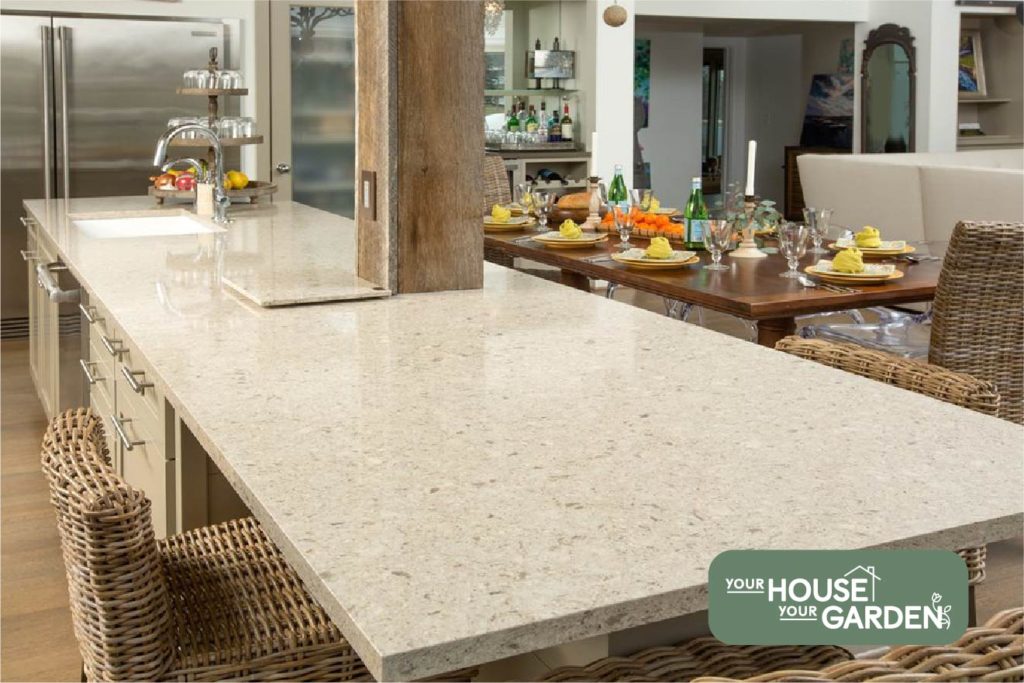
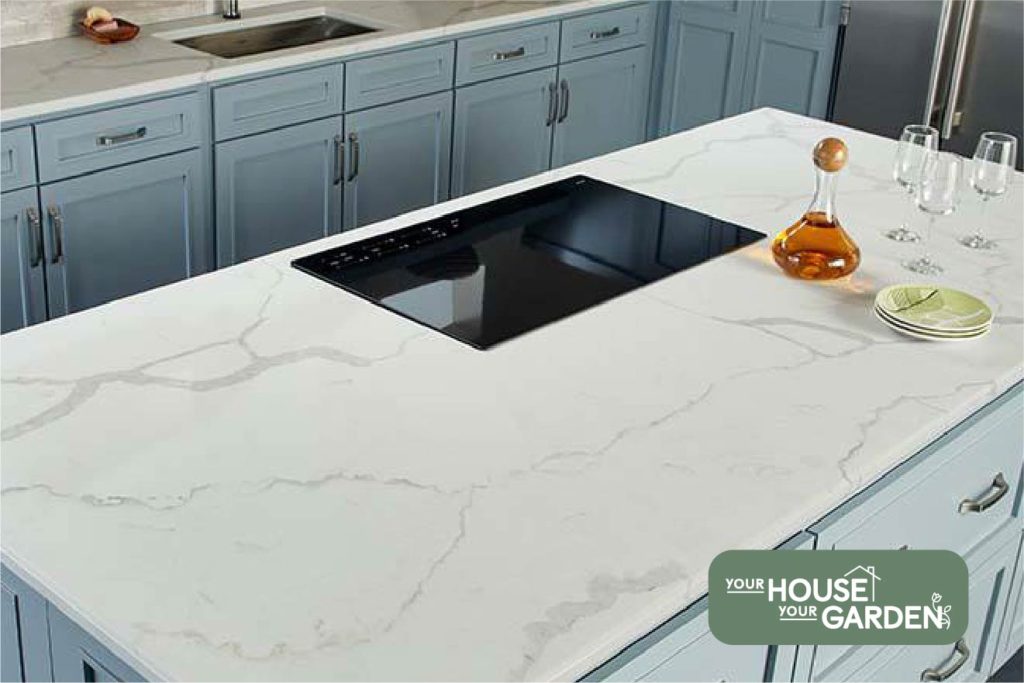
FAQs on Quartz Countertops
Is quartz better than granite?
Yes, quartz countertops can be better than granite countertops. Granite countertops are made out of natural stone but quartz cut outs or a slab is made out of some of the hardest minerals which enable its durability.
Quartz countertops can also have less visible seams compared to a material like granite and are easier to maintain because quartz slabs do not require any sealing. Also, though granite can have flecks, a marble pattern, or simply be a solid surface, quartz countertops are engineered to be available in more styles, patterns, or mimic other materials.
What are the negatives of quartz countertops?
Quartz countertops are definitely an investment but this material does have some drawbacks. For example, quartz countertops cost more than materials like granite, rugged concrete, chrome steel, solid surface, tile, laminate, and glass per square foot.
Additionally, quartz countertops cannot withstand extreme heat. Typically, quartz countertops will scorch if you remove a pan from the heat of a cooktop and place it directly on your counter. However, quartz countertops will crack when temperatures reach 300°F (149°C.)
Aside from high prices and the fact that quartz is not completely heat-resistant, there are limited styles if you want to buy a sink for a more cohesive space.
How much does a quartz countertop cost?
Compared to other materials, quartz has a high cost, and the price quote that a manufacturer will give you will for your countertops will range from $50 to $200 per square foot.
How long do quartz countertops last?
Quartz kitchen countertops, or ones for a bathroom, can last as little as 10 years but as much as a lifetime when maintenance is a priority. This material may cost more than others but manufacturers offer 15-year to lifetime warranties because quartz slabs are resistant to stains, mold, as well as moisture, and are made out of one of the hardest materials on Earth.
What are the brands that manufacture the best kitchen countertops?
The most popular countertop manufacturers are:
Caesarestone:
Caesarestone offers premium quartz countertops that are timeless, durable, and has endless design potential for all kitchens.
Cambria Quartz:
With innovative designs, Cambria Quartz has become a leading provider of stunning and quality countertops. Customize and enjoy the natural stone, low-maintenance, durable countertops that Cambria has to offer.
Corian Quartz:
Corian countertops are designed to withstand daily wear and tear and fit seamlessly into contemporary-style kitchens. Corian countertops are easy to maintain, will last years, and can be made out of custom-made slabs with different color combinations and designs.
HanStone:
Countertops manufactured by HanStone are heatproof, can withstand scratching, and does not stain. HanStone has designed its countertops to prevent bacteria or mildew growth and has a variety of non-porous, colouful options available.
LG Viatera:
Viatera surfaces offer you strength, hygiene, and minimal countertop maintenance. Each countertop is produced with high-quality and sustainable quartz which is an elegant and reliable choice for homes and businesses alike.
Silestone:
If you’re looking for spill, stain, impact, and scratch-proof countertops, Silestone has a beautiful selection just for you. This manufacturer designs countertops for life and there are a variety of patterns, finishes, and colors to choose from.
What is the most affordable type of kitchen countertop?
The most budget-friendly material you can buy for your kitchen’s countertops is laminate. Made famous by Formica, laminate countertops have endless design options that can easily be integrated into any kitchen. However, laminate can be difficult to repair, has a relatively short lifespan, and is susceptible to delamination and chipping.
What is the best countertop material?
The best kitchen countertop material is granite. A granite countertop can withstand a pan that has been heated up to 1200°F (649°C) which makes this material a popular choice in commercial kitchens.
Additionally, each granite slab is a unique color, durable, and affordable even if you choose to get it professionally installed.
How do you choose new countertops?
The most important question to ask yourself is how your kitchen space is used. This will help you determine whether or not you need a slab that will not stain or be prone to scratches. You should also think about how much maintenance you are willing to put in after you install new countertops because some will need sealing more often than others.
Also, think about your space and the style of your current kitchen to narrow down materials and the different shades they are available in. Would you rather have wood that has been sanded down for a rustic feel or a tile surface that is vibrant and modern? You should also consider your budget before heading out to the store and picking out potential countertops.
